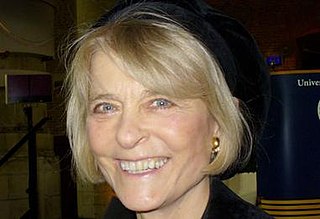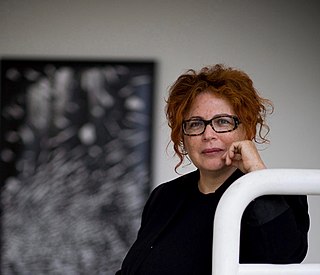Camilla Adang (born 1960) is a Dutch associate professor of Islamic studies at Tel Aviv University in Tel Aviv, Israel. [1]
Adang was born in Bussum, Netherlands in 1960. [2] [3] Adang completed her doctorate in Islamic studies at Radboud University Nijmegen in Nijmegen. [3]
Adang was a fellow at the Netherlands Institute for Advanced Study in Wassenaar from September 2009 to June 2010. While there, she published a number of works on the life of Medieval Andalusian theologian Ibn Hazm and his views. [3] [4] During this time, she also contributed to a book on inter-religious polemics and rational theology. Adang was also a fellow at The Woolf Institute in Cambridge as of 2011. During this time, she delivered a seminar on Muslim-Jewish polemics in Medieval Spain which was noted for Adang's definition of Muslim Fatwas are merely legal verdicts, rather than "death sentences" as popularly portrayed in the media, [5] in addition to chairing a roundtable discussion of linguistic influences on Judeo-Muslim exchanges. [6]
Adang has also written multiple encyclopedia articles and research papers on Muslim-Jewish polemics. [7]

Habakkuk, or Habacuc, who was active around 612 BC, was a prophet whose oracles and prayer are recorded in the Book of Habakkuk, the eighth of the collected twelve minor prophets in the Hebrew Bible. He is revered by Jews, Christians, and Muslims.

Judeo-Arabic is Arabic, in its formal and vernacular varieties, as it has been used by Jews, and refers to both written forms and spoken dialects. Although Jewish use of Arabic, which predates Islam, has been in some ways distinct from its use by other religious communities, it is not a uniform linguistic entity.
Takfir is an Arabic and Islamic term which denotes excommunication from Islam of one Muslim by another, i.e. accusing another Muslim of being an apostate. The word is found neither in the Quran nor in the ḥadīth literature; instead, kufr ("unbelief") and kāfir ("unbeliever") and other terms employing the same triliteral root K-F-R appear.

Ibn Hazm was an Andalusian Muslim polymath, historian, traditionist, jurist, philosopher, and theologian, born in the Córdoban Caliphate, present-day Spain. Described as one of the strictest hadith interpreters, Ibn Hazm was a leading proponent and codifier of the Zahiri school of Islamic jurisprudence, and produced a reported 400 works, of which only 40 still survive.

Patricia Crone was a Danish historian specialising in early Islamic history. Crone was a member of the Revisionist school of Islamic studies and questioned the historicity of the Islamic traditions about the beginnings of Islam.

Moshe Gil was an Israeli historian.
Muhammad Khalid Masud is the Director General of Islamic Research Institute, International Islamic University, Islamabad, Pakistan. The President of Pakistan appointed Mr. Masud as an Ad Hoc Member of Shariat Appellate Bench of the Supreme Court on 18 October 2012. On 1 November 2012, he took the oath administered by Chief Justice of Pakistan as an Ad Hoc Member of Shariat Appellate Bench of Supreme Court of Pakistan. Formerly he was Chairman (2004–2010) of the Council of Islamic Ideology in Pakistan.

Ze’ev Maghen is an Israeli scholar. He is a professor of Arabic and Islamic history and chairman of the Department of Middle East Studies at Bar-Ilan University. Maghen is also a senior fellow at the Begin-Sadat Institute for Strategic Studies, as well as the founder of the Middle East and Islamic Studies program at Shalem College in Jerusalem.
The canon of work by Ibn Hazm, prolific and important Andalusian jurist, belletrist, and heresiographer is extensive. He was said to have written over 400 books.

Maya Cohen Levy, also known as Maya Cohen-Levy, is an Israeli painter and sculptor.
Birgit Krawietz is professor of Islamic Studies at the Institut für Islamwissenschaft at the Freie Universität Berlin.

Joseph Sadan is emeritus professor of the Department of Arabic and Islamic Studies at the Tel-Aviv University. He has also taught and research at the Hebrew University of Jerusalem and research institutions in Europe, as well as at Haifa University and Menashe College. Sadan studied at the Hebrew University (1958–1963) where he received his BA and MA degrees. Between 1965 and 1969/70 he worked on his Ph.D. thesis at the Sorbonne in Paris. The subject of the dissertation was furniture in the Middle East in medieval times. In 1989 he was promoted to Full Professor and retired in 2007. He held the Irene Helmus Chair for Arabic Literature until October 2009.
Steven B. Bowman is an American scholar and academic particularly known for his research of Greek and Jewish relations throughout the past three millennia, with emphasis on Byzantine and Holocaust periods. He is a professor of Judaic Studies at the University of Cincinnati, where he teaches a wide range of courses in ancient and medieval Judaic Studies and modern Israel.
Jewish polemics and apologetics in the Middle Ages were texts written to protect and dissuade Jewish communities from conversion to Christianity, or more rarely to Islam. The terms polemics and apologetics may be distinguished but may also be considered somewhat subjective. A smaller number of proselytizing text also exists intended to convert Christians, or more rarely Muslims, to Judaism. However, the vast majority of Jewish polemical literature was written in response to Christian polemical writings and with a permanent reference to Christian arguments.
Robin Fleming is an American medievalist and a professor of history at Boston College. She is the president of the Medieval Academy of America and a 2013 MacArthur Fellow. She has written several books focusing on the people of Roman Britain and early medieval Britain, using both archaeological evidence and written records.
Hana Wirth-Nesher is an American-Israeli literary scholar and university professor. She is Professor of English and American Studies at Tel Aviv University, where she is also the Samuel L. and Perry Haber Chair on the Study of the Jewish Experience in the United States, and director of the Goldreich Family Institute for Yiddish Language, Literature, and Culture.

Yaron Tsur, an historian of the Jews in the Muslim lands in the modern era, is amongst the founders of the Open University of Israel, a professor in the department of Jewish history at Tel Aviv University and a former chairperson of its graduate school of Jewish studies. He is a pioneer in the field of Digital Humanities in Israel and the founder of the "Historical jewish press" website.
Uriya Shavit is an Israeli author and professor of Islamic studies at Tel Aviv University (TAU). Since 2016, he has served as the head of TAU’s Department of Arabic and Islamic Studies and the Graduate Program in Religious Studies. Since 2021, Shavit serves as head of the Kantor Center for the Study of Contemporary European Jewry as well as co-head of the Shandong-Tel Aviv Institute for Israel and Jewish Studies. Shavit has also worked as a columnist for “Haaretz” and other Israeli newspapers and authored novels and books for young readers. He specializes in the study of contemporary Islamic law, theology, politics and Muslim minorities in the West.
Tamar Herzig is an Israeli historian of Early Modern Europe who specializes in religious, social, minorities, and gender history, with a focus on Renaissance Italy. She is the Konrad Adenauer Professor of Comparative European History at Tel Aviv University and since 2021 also serves as the Vice Dean for Research of the Faculty of Humanities.

Hava Lazarus–Yafeh was a German-born Israeli Orientalist, scholar, editor, and educator. She known for her work in medieval and modern Islamic Studies and interfaith relations. Lazarus–Yafeh was a professor and a head of the Department for Islamic Civilization at the Hebrew University of Jerusalem. She won the Israel Prize in history in 1993.